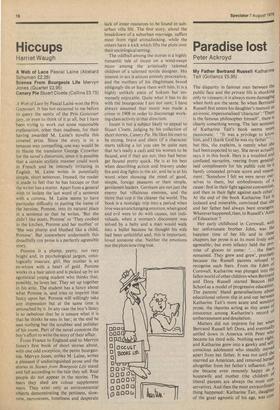Hiccups
Harriet Waugh
A Web of Lace Pascal Laine (Abelard Schuman £2.28) Scenes From Bourgeois Life Mervyn Jones (Quartet £3.95) Canary Pie Stuart Cloete (Collins £3.75)
A Web ollace by Pascal Laine won the Prix Goncourt. It has not occurred to me before to query the sanity of the Prix Goncourt jury, or even to think of it at all, but I have been trying to work out some reasonable explanation, other than madness, for their having awarded M. Laine's novella this coveted prize. Since the story is in a tenuous way compelling, one way would be to blame the translator George Crowther for the novel's distortion, since it is possible that a certain stylistic manner could work in French and be intensely irritating in English. M. Laine writes in potentially simple, short sentences. Instead, the reader is made to feel that he has hiccups or that the writer has a stutter. Apart from a general wish to isolate the last word of a sentence with a comma, M. Laine seems to have particular difficulty in putting the name of the heroine, Pomme, into its natural place in a sentence so that he writes, 'But she didn't like poets, Pomme' or 'They cooked in the kitchen, Pomme and her mother' or 'She was plump and blushed like a child, Pomme'. But somewhere underneath this dreadfully coy prose is a perfectly agreeable story.
Pomme is a plump, pretty, not very bright and, in psychological jargon, ontologically insecure, girl. Her mother is an ex-whore with a heart of gold. Pomme works in a hair salon and is picked up by an egotistical young student who thinks that, possibly, he loves her. They set up together in his attic. The student has a fancy about what Pomme is, and tries to imprint that fancy upon her. Pomme will willingly take any impression but at the same time is untouched by it. In any case the boy's fancy is so nebulous that he is unsure what it is that he thinks he sees in her; in the end he sees nothing but the scrubber and polisher of his room. Part of the novel concerns the boy's effort to write the story of their affair.
From France to England and to Mervyn Jones's first book of short stories about, with one odd exception, the petite bourgeoisie. Mervyn Jones, unlike M. Laine, writes a pleasant if undistinguished prose and the stories in Scenes from Bourgeois Life stand and fall according to the tale they tell. Real people do not appear in the stories. The tears they shed are colour supplement tears. They exist only as environmental objects demonstrating the pettiness, slowness, narrowness, loneliness and desperate lack of inner resources to be found in suburban villa life. The first story, about the breakdown of a suburban marriage, suffers most from rigid attitudinising, while the others have a kick which lifts the plots over their sociological setting.
The oddball among the stories is a highly romantic tale of incest on a wind-swept moor among the artistically talented children of a talented textile designer. His interest in sex is almost entirely procreative, and the mothers of his illegitimate brood obligingly die or leave them with him. It is a highly unlikely piece of hokum but immensely enjoyable. Quite what it has to do with the bourgeoisie I am not sure; I have always assumed that incest was made a crime in 1908 in order to discourage working-class activity in that direction.
Incest is not a subject likely to appeal to Stuart Cloete, judging by his collection of short stories, Canary Pie. He likes his men to be strong, brave and silent (if a character starts talking a lo(you can be quite sure that he's really a cad) and his women to be fecund, and if they are not, they had better get fecund pretty quick. He is at his best when describing action and bravery under fire and dog fights in the air, and he is at his worst when showing the mind of good, simple, foreign peasants or their simple, gentlemen leaders. Germans are not just the enemy but villainous enemies, and the more that cop it the cleaner the world. The book is a nostalgic trip into a period when love was an unchanging emotion, when good and evil were to do with causes, not individuals, when a woman's discontent was solved by a baby and a man would walk into a bullet because he thought his wife had been unfaithful and, this is important, loved someone else. Neither the emotions nor the plots now ring true.


























 Previous page
Previous page